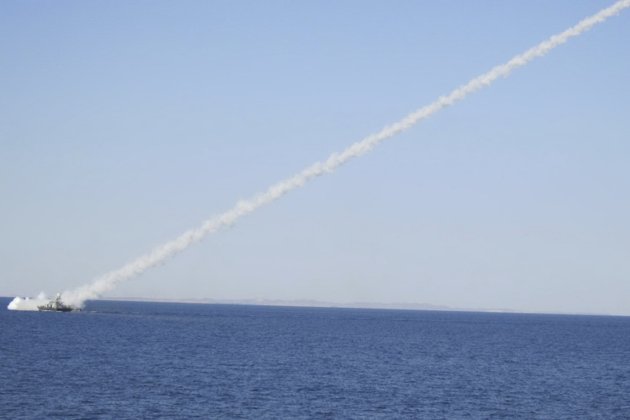
Iran on Tuesday test-fired in its central desert a ballistic missile capable of striking Israel as part of war games designed to show its ability to retaliate if attacked, media said.
Iran's Revolutionary Guard fired the medium-range Shahab-3 missile at a mock target in the Kavir Desert on the second day of its Great Prophet 7 exercise, which is due to end on Wednesday, Iran's Al-Alam television network reported.
The Shahab-3 has a range of up to 2,000 km (1,200 miles), which means it is theoretically able to hit Israel, which is some 1,000 km away.
Al-Alam said two short-range missiles, the Shahab-1 and Shahab-2, with ranges of 300 to 500 km, were also launched.
The Fars news agency said "dozens" of different types of missiles were fired from different parts of Iran at a single target in the Kavir Desert.
"In these exercises, we used missiles with a range of 2,000 km, but the plan called for them to be fired only 1,300 km," Fars quoted the head of the Guards aerospace division in charge of missile systems, Brigadier General Amir Ali Hajizadeh, as saying.
The ISNA news agency said the last day of the drill would see Revolutionary Guard "bomber drones" also used.
Although the Islamic republic has test-fired its Shahab missiles before, and frequently holds military maneuvers, it says these war games are aimed at sending a message to Israel and the United States to think twice on their threats of possibly attacking Iran.
"The message of these Grand Prophet 7 maneuvers is to show the determination, the will and the power of the Iranian people in defending their national interests and core values," the number two of the Revolutionary Guards, General Hossein Salami, said, according to the official IRNA news agency.
"It's a reaction to those who are politically discourteous to the Iranian people by saying 'all options are on the table'," he said.
He added that the launches were "100 percent successful".
The exercise targeted a replica military base set up in the desert and made to look like a foreign facility, similar to those the United States has in neighboring countries such as Afghanistan.
The launch of the Shahab-3 missile coincided with the day experts from Iran and world powers were to hold talks in Istanbul to discuss the West's push to have Tehran scale back its sensitive nuclear program.
Israel, which is not part of the talks, and its ally the United States have both said they reserve the option of military action against Iran if diplomacy and sanctions fail to convince it to curb its atomic activities.
US President Barack Obama has said several times that "all options" remain on the table.
Iran's test-firing of its missiles also occurred on the anniversary of the 3 July, 1988 shooting down of an Iranian commercial airliner by a US warship towards the end of the Iran-Iraq war.
All 290 passengers and crew on the plane died in the attack, which Washington said was the result of erroneously identifying the civilian aircraft as an Iranian fighter jet.




